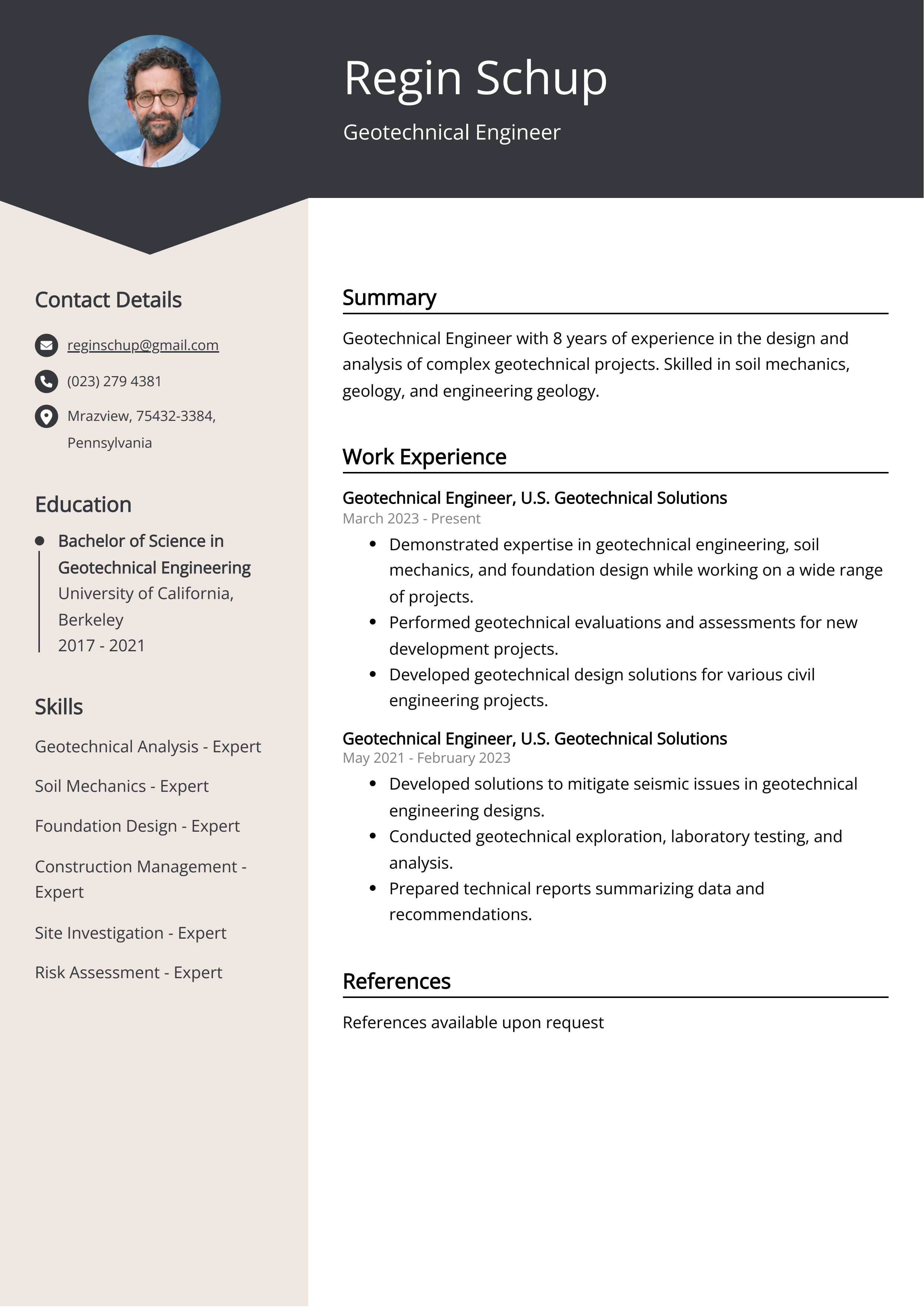Geotheta Fundamentals Explained
Geotheta Fundamentals Explained
Blog Article
Indicators on Geotheta You Need To Know
Table of ContentsGeotheta Things To Know Before You BuyThe Only Guide for GeothetaThe smart Trick of Geotheta That Nobody is Talking AboutThe smart Trick of Geotheta That Nobody is DiscussingAbout Geotheta

They conduct site examinations, accumulate samples, carry out lab examinations, and analyze data to assess the suitability of the ground for building and construction projects - Engineer of Record. Based upon their searchings for, geotechnical designers supply referrals for structure layout, incline security, retaining structures, and mitigation of geotechnical risks. They work together with various other experts, such as designers, architectural engineers, and building and construction groups, to make sure that geotechnical factors to consider are incorporated right into the general task style and execution
By analyzing the actions and residential or commercial properties of soil and rock, they can identify potential geotechnical threats such as landslides, dirt negotiation, or slope instability. Their know-how assists stop failures or accidents that can jeopardize lives and property. Below are some thorough tasks and responsibilities of a geotechnical engineer: Site Examination: Geotechnical designers conduct site investigations to collect data on subsurface conditions.
They interpret the data to comprehend the buildings and behavior of the soil and rock, including their strength, permeability, compaction characteristics, and groundwater conditions. Geotechnical Evaluation and Layout: Geotechnical engineers analyze the data accumulated throughout website investigations to evaluate the stability and suitability of the site for construction projects. They execute geotechnical estimations and modeling to review aspects such as birthing capability, settlement, incline stability, side planet stress, and groundwater circulation.
Things about Geotheta
Foundation Design: Geotechnical designers play an essential duty in creating foundations that can safely sustain the designated structure. They examine the soil problems and load needs to identify the appropriate foundation type, such as superficial structures (e.g., grounds), deep foundations (e.g (https://www.blogtalkradio.com/geotheta)., piles), or specialized strategies like dirt enhancement. They think about variables such as negotiation limits, birthing ability, and soil-structure communication to establish optimal structure styles
They evaluate building and construction strategies, monitor website activities, and perform field inspections to validate that the style suggestions are followed. If unpredicted geotechnical concerns occur, they evaluate the scenario and supply suggestions for removal or modifications to the design. Threat Evaluation and Mitigation: Geotechnical designers assess geotechnical threats and dangers related to the task site, such as landslides, liquefaction, or dirt erosion.

Cooperation and Interaction: Geotechnical engineers function closely with various other experts associated with a job, such as architects, architectural engineers, and construction groups. Effective interaction and collaboration are vital to incorporate geotechnical considerations into the total job design and building process. Geotechnical engineers give technical expertise, response questions, and guarantee that geotechnical needs are satisfied.
The Facts About Geotheta Revealed
Below are some types of geotechnical engineers: Foundation Engineer: Foundation engineers focus on making and analyzing foundations for structures. They evaluate the dirt problems, lots needs, and site qualities to identify the most suitable structure kind and style, such as superficial structures, deep structures, or specialized methods like stack foundations.
They examine the aspects affecting slope stability, such as soil buildings, groundwater problems, and slope geometry, and establish techniques to stop incline failings and minimize threats. Quake Engineer: Earthquake engineers specialize in analyzing and designing frameworks to hold up against seismic pressures. They examine the seismic danger of a site, assess soil liquefaction possibility, and create seismic design standards to guarantee the security and durability of structures throughout quakes.
They do field testing, accumulate examples, and evaluate the collected information to define the soil properties, geologic developments, and groundwater problems at a site. Geotechnical Instrumentation Designer: Geotechnical instrumentation designers concentrate on surveillance and determining the behavior of soil, rock, and structures. They mount and preserve instrumentation systems that monitor variables such as soil settlement, groundwater degrees, slope activities, and structural variations to evaluate efficiency and offer very early warnings of potential problems.
How Geotheta can Save You Time, Stress, and Money.
They carry out examinations such as triaxial tests, loan consolidation tests, straight shear examinations, and permeability tests to collect information for geotechnical analysis and style. Geosynthetics Designer: Geosynthetics designers specialize in the style and application of geosynthetic products, such as geotextiles, geogrids, and geomembranes. They utilize these products to improve soil security, enhance slopes, offer water drainage solutions, and control erosion.
They tend to be investigative individuals, which implies they're intellectual, introspective, and curious. They are curious, methodical, logical, analytical, and logical. Some of them are likewise social, implying they're kind, generous, cooperative, patient, caring, helpful, empathetic, sensible, and pleasant - Geo Tech Engineer.
In the office environment, geotechnical designers make use of specialized software program tools to carry out calculations, create layouts, and examine data. They prepare reports, testimonial job specs, communicate with clients and team participants, and coordinate job activities. The workplace setting provides a helpful atmosphere for research, evaluation, and collaboration with various other experts involved in the task.
7 Easy Facts About Geotheta Shown
They regularly check out task sites to carry out website investigations, analyze geotechnical conditions, and collect information for analysis. These brows through include taking a trip to various places, occasionally in remote or challenging surfaces. Geotechnical engineers may perform soil tasting, conduct tests, and screen building and construction activities to guarantee that the geotechnical facets of the project are being executed appropriately.
Geotechnical engineers also function in specialized geotechnical research laboratories. In these facilities, they carry out experiments, do examinations on dirt and rock samples, and examine the design residential properties of the products. Geotechnical research laboratory designers work extensively informative post in these atmospheres, managing screening tools, running tools, and recording data. They work together with various other lab team to make certain exact and reliable testing results.
Report this page